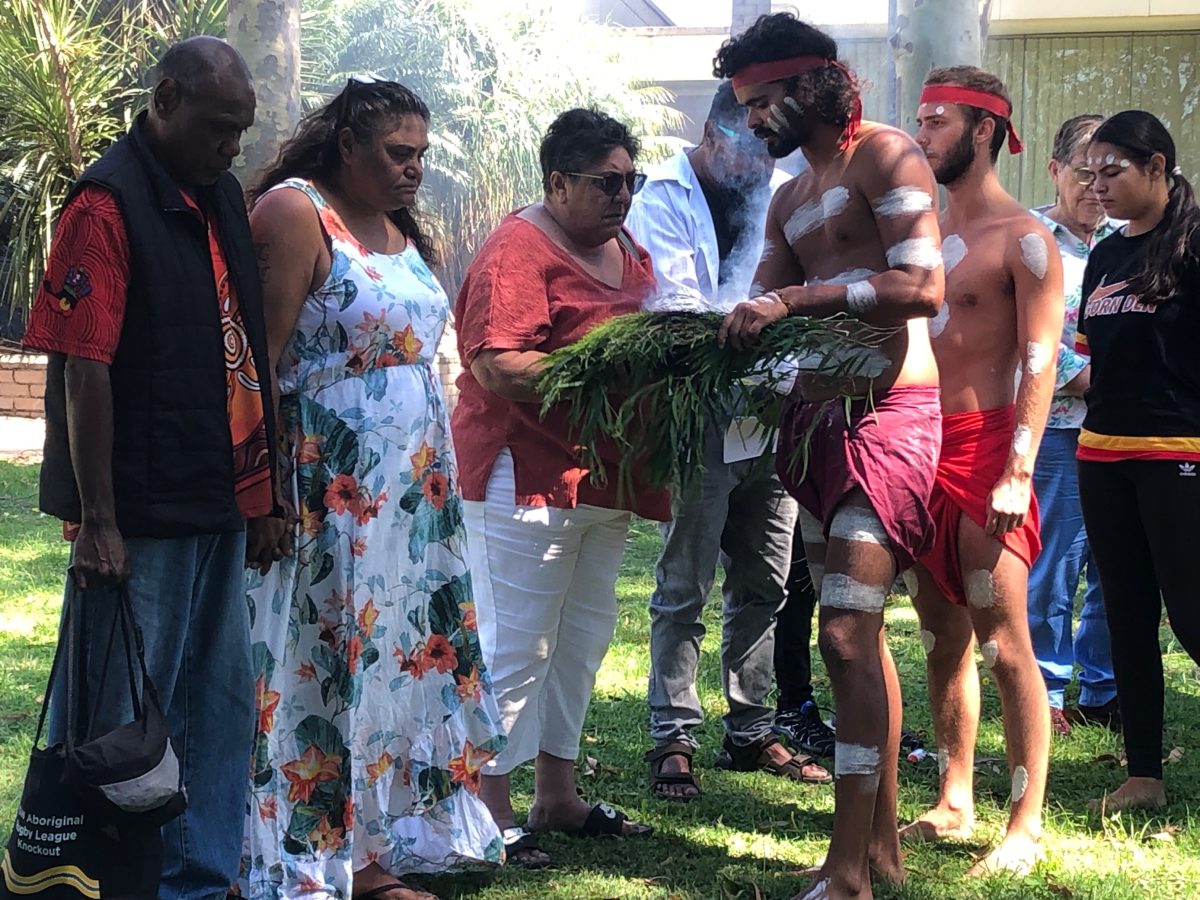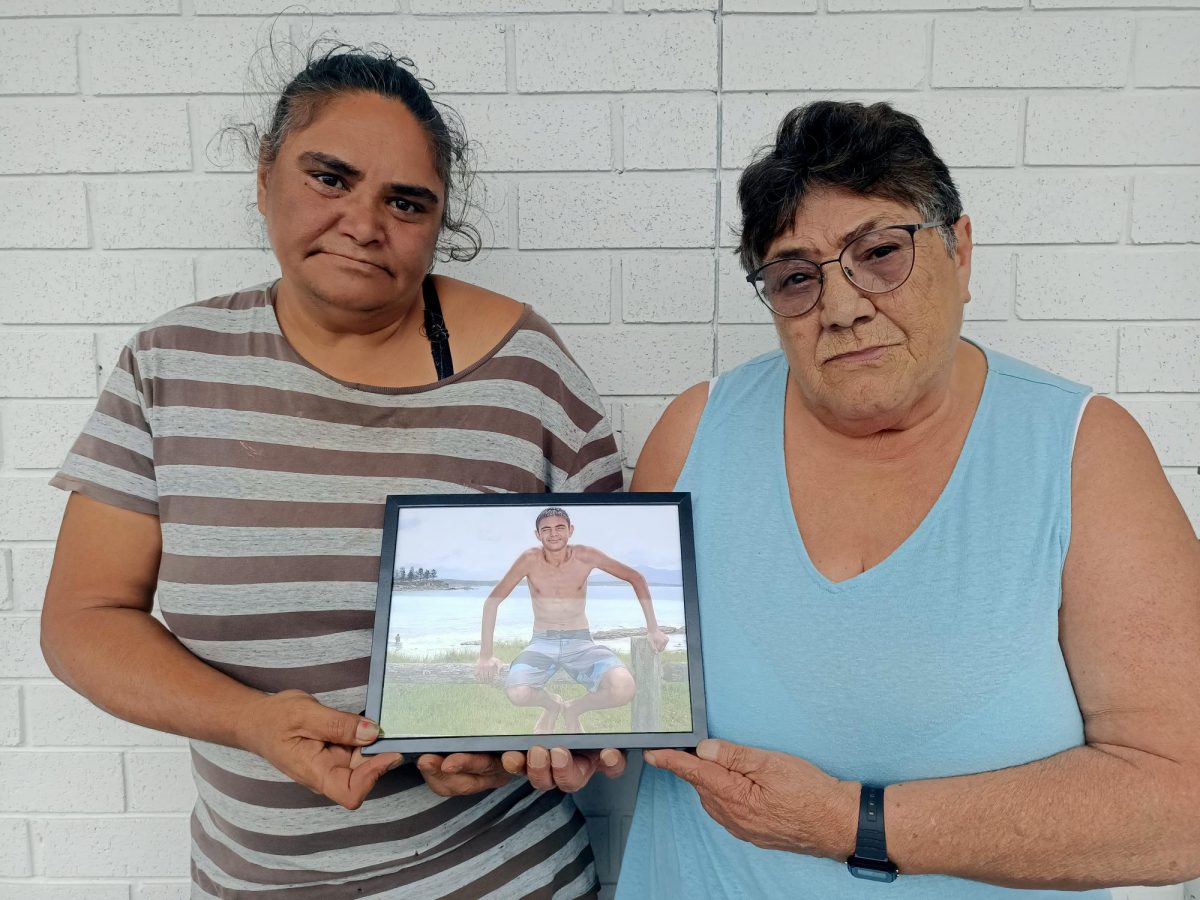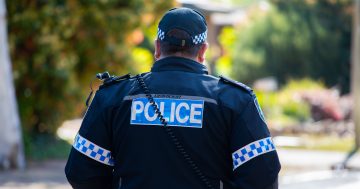
A smoking ceremony was held after the inquest in Batemans Bay earlier this year. Photo: National Justice Project.
First Nations readers are advised this article contains an image and name of a person who has died.
The family of a 17-year-old First Nations boy who died while under the care of the NSW Department of Communities and Justice (DCJ) is disappointed that a coronial inquest into his death hasn’t come up with any recommendations to make changes in the department.
The findings for the inquest for George Joseph Charles Campbell, a Yuin-Dunghutti-Tharawal teenager, were handed down by Coroner Teresa O’Sullivan in Batemans Bay on Tuesday (22 August).
He had been found at Wallaga Lake Koori Village five years ago after disappearing the day before and his mother, Karen Campbell, previously told the inquest that his death left “the biggest hole in [her] heart”.
“George’s passing is a heartbreaking tragedy that has affected many lives,” Coroner O’Sullivan said.
She offered her condolences to his family and thanked them for their courage in sharing stories about him.
“Through sharing these stories and memories it is very clear to me how much they loved George and how much they miss him,” she said.
The coroner found George died on 9 or 10 March 2018 and his cause of death was hydrocarbon toxicity.
She said he died while under the parental responsibility of DCJ after using a petroleum product and the evidence did not establish that he used that product because he wanted to end his life.
After the findings were announced, George’s family said more could have been done to provide cultural connections for him before he went missing.
His mother Karen, grandmother Fay Campbell and uncle Rodney Kelly expressed their disappointment in the absence of recommendations to change DCJ.
“A lot more needs to be done. We need our own services and our own people looking after our kids, not the colonial system of out-of-home care,” they said.
“We need some accountability for George, because the minister and their people should have taken proper care of George.
“It is a terrible thing to have happened, it shouldn’t happen to any mother.”

The death of George Campbell, pictured in the frame held by his mother and grandmother, has been the subject of an inquest. Photo: National Justice Project.
Karen said if George had been allowed to interact with his family, then maybe things would have been different.
“My son would still be here if things had been done properly,” she said.
Advocates from the National Justice Project (NJP), a human rights law firm representing George’s family, said more needed to be done to provide culturally safe care to First Nations youth in state care.
“The status quo is failing young people like George. Aboriginal children are relying on DCJ to do its job properly. There are lives at stake,” NJP principal solicitor George Newhouse said.
“Services to Aboriginal children should be provided by independent First Nations organisations, as it is obvious that DCJ cannot do its job.”
In its submissions to the coroner, the NJP had argued that George’s cultural plan was inadequate, did not take into consideration his own desires and aspirations, and did not have accountability in place to ensure it was delivered.
George, who was named after his grandfather, grew up in the Bega Valley and the Eurobodalla and went to schools in Bermagui, Narooma and Moruya.
His family remembered him as a funny person who made everyone laugh, who liked fishing but didn’t like eating fish, who was caring, energetic and loved camping and learning about culture.
His schoolfriends organised for a plaque to be made in his memory that read: “George Campbell – a larrikin in every sense. Once met, never forgotten and gone too soon”.
Coroner O’Sullivan did say she wanted the inquest’s findings to be brought to the attention of the minister responsible for DCJ.
A DCJ spokesperson said the death of any young person was a tragedy and the department extended its deepest sympathy to George’s family, carers and community.
“As Her Honour State Coroner O’Sullivan noted in her findings yesterday, DCJ practices have changed significantly since George’s tragic death,” the spokesperson said on Wednesday (23 August).
“DCJ takes its obligations to protect vulnerable children very seriously and, in light of the comments made by Her Honour in her findings, will consider whether there are any further improvements that can be made.”
The spokesperson also said Minister for Families and Communities Kate Washington had noted the concerns raised about DCJ’s previous practices and she supported any additional improvements to further enhance DCJ’s capacity to keep children and young people safe from harm.
If you or someone you know needs help, you can contact:
Lifeline’s 24-hour crisis support line – 13 11 14
Suicide Call Back Service – 1300 659 467
Kids Helpline – 1800 551 800 or kidshelpline.com.au
MensLine Australia – 1300 789 978 or mensline.org.au









Wow!!! Getting (almost) in front of the game wrt AI. Let’s hope all planned updates to the… View